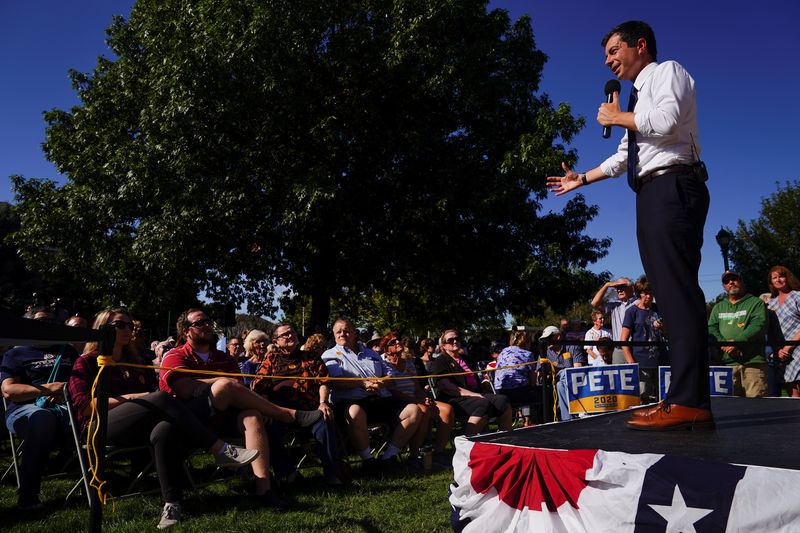By Jarrett Renshaw
WEBSTER CITY, Iowa (Reuters) - Marsha Anderson, 66, is passionate about Pete Buttigieg, the 37-year-old mayor of South Bend, Indiana, extolling his youth, calmness and measured approach to policies.
But when it comes to the first-in-the-nation nominating caucuses in Iowa in February, which can have an outsized role in helping pick presidential nominees, she plans to vote for one of his rivals, Joe Biden, the former vice president and Democratic presidential front-runner.
“I don’t think Pete can win,” said Anderson, a substitute teacher and lifelong Democrat from Webster City, Iowa. She came to catch a glimpse of the candidate, who made a stop in her neighborhood on Sunday as part of his four-day bus tour across the crucial early voting state.
“I would love to vote for the best candidate, but it doesn’t always work out that way.”
Buttigieg’s success in the Iowa caucuses will depend partly on his ability to convert voters like Anderson who are attracted to his calm, intelligent demeanor and his life story - an openly gay former Naval Reserve officer and Rhodes scholar - but are not convinced he can beat Republican President Donald Trump in the November 2020 election.
The Buttigieg campaign is betting that his strong likability and deep pockets will ultimately break through in a race where only one out of every five caucus-goers has decided on a candidate.
"If history is any guide, we are right where we need to be in September,” Buttigieg, wearing a white button-down shirt and dress pants, told reporters on Monday aboard his campaign bus, which was once used by former Democratic President Barack Obama, whom the Buttigieg campaign often invokes as facing similar challenges.
As he crisscrossed the state from the suburbs of Des Moines to rural communities like Elkader, Buttigieg provided hours of almost unfiltered access to about a dozen reporters, delving into politics, policies and a bit of his personal life.
In a Des Moines Register/CNN Poll released on Friday, Buttigieg ranked fourth, with 9% support from likely Iowa caucus-goers, down from 15% in June and a fair distance from the race's three front-runners - U.S. Senator Elizabeth Warren of Massachusetts at 22%, Biden at 20% and U.S. Senator Bernie Sanders of Vermont at 11%.
But Buttigieg, who has struggled to break into the top tier nationally, boasts some of the best favorability numbers in Iowa among the 19 Democratic contenders for the White House. He was viewed favorably by 69% of respondents, second only to Warren at 75%. Just 13% of respondents viewed Buttigieg unfavorably, the lowest among the Democratic candidates.
“The two biggest takeaways are we are in the category of candidates who could win and that most people have not made up their mind," Buttigieg said.
His campaign believes he has to finish in the top three in Iowa to remain viable. That could help persuade black voters, a group he has struggled to attract, to give him a harder look in majority-black South Carolina, another early voting state.
Money may help him get there.
Buttigieg raked in an eye-popping $24.8 million in the second quarter, more than anyone else, but he has only recently begun to spend that money seriously in Iowa. He recently opened 20 offices in the state and built a staff of 100, among the biggest state operations in the field.
He is the only candidate running ads on the state's popular agricultural talk-radio shows, hoping his Midwestern roots will help attract rural voters.
POLICIES, POLITICS AND LIFE
The bus tour came on the heels of the annual Polk County Steak Fry Dinner, a highly watched Democratic Party event that serves as a barometer of the nominating race. Buttigieg drew a large crowd of boisterous supporters that was surpassed only by Warren, who arguably won the summer campaign season.
On the stump, Buttigieg sold himself as a pragmatic politician offering a youthful vision for the country.
He decried “purity tests” of liberal positions that he says are required by the left wing of his party and took aim at voters who may be throwing their support behind Biden because he is the most traditional candidate.
“When we try to play it safe, we come up short. We win when we put forward inspiring leadership often from a new generation not too connected to Washington and calling America to be more than we have ever been,” Buttigieg said.
He attempted to draw contrasts between himself and his more progressive rivals on healthcare who are pushing for Medicare for All, proposals that would all but eliminate private insurance in favor of federal health insurance coverage for all Americans based on the existing government-run Medicare program for people aged 65 and older.
He is proposing a "Medicare for All who want it" approach, which he says protects people who like their company-sponsored plans, while offering a low-cost public option.
He wants to help young people afford college, but focusing on low-income and middle-class students instead of more broad proposals offered by some of his rivals that he says are unrealistic.
"For all my promises, I will show in great detail how I am paying for it," Buttigieg said.
On the bus, Buttigieg also gave a glimpse into his personal life.
He and his husband, Chasten, want to have children, starting right after the campaign ends, whether in defeat or winning the White House.

"I think it's about time we have a toddler in the White House," Buttigieg said.